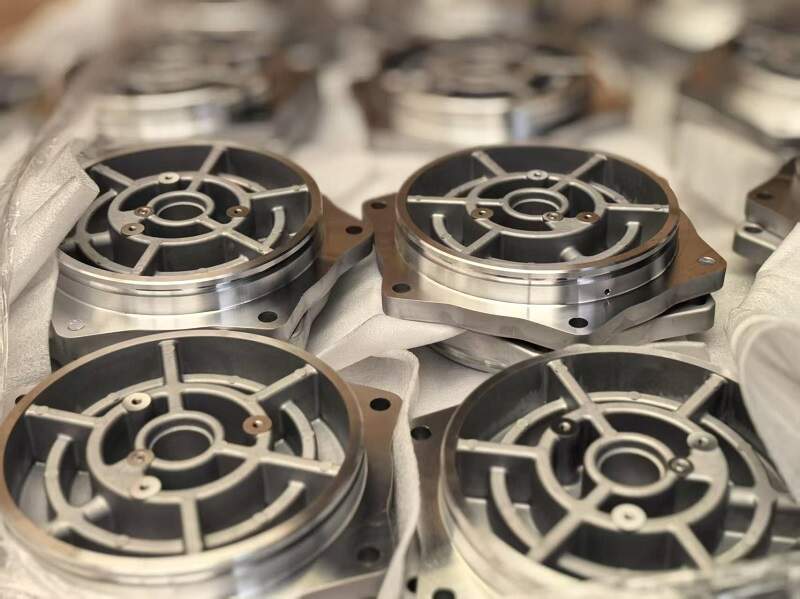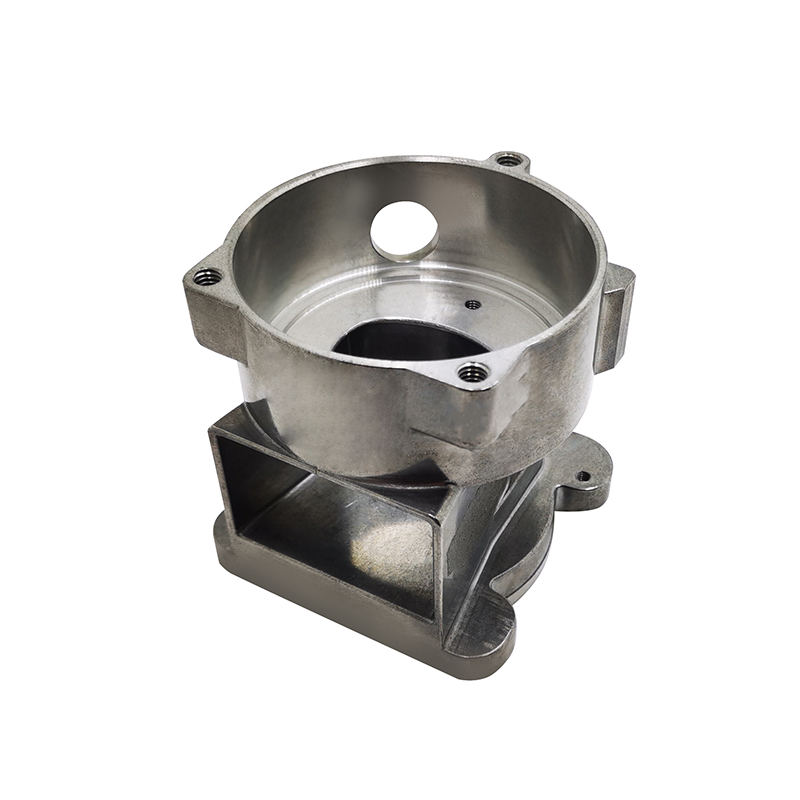The Duty of Light Weight Aluminum Foundries beforehand Lightweight Manufacturing Solutions
Aluminum shops greatly add to the evolution of lightweight manufacturing options. Their innovative spreading modern technologies yield high-strength, light-weight components necessary for industries such as auto and aerospace. This innovation not only enhances product performance however also advertises sustainability through using recycled products. As these factories adjust to emerging innovations and techniques, they pave the means for future growths in producing performance and ecological obligation. What lies ahead in this transformative trip?
The Benefits of Lightweight Materials in Manufacturing
As industries increasingly look for performance and sustainability, the adoption of lightweight materials in manufacturing has arised as a crucial method - aluminum casting. These products, especially light weight aluminum and compounds, offer countless benefits that improve production procedures and item efficiency. Mostly, their lowered weight contributes to decrease energy consumption throughout transportation and procedure, bring about substantial cost savings
Moreover, light-weight products facilitate the layout of more facility geometries, permitting better advancement in item advancement. This adaptability usually results in improved performance and performance, dealing with the progressing needs of modern consumers.
In addition, the use of lightweight materials can boost the longevity of items due to their resistance to deterioration and exhaustion. This toughness not just minimizes maintenance costs however likewise supports sustainability initiatives, as longer-lasting products contribute to much less waste. To summarize, the advantages of lightweight products are crucial in driving effectiveness, advancement, and ecological responsibility in production.
Developments in Light Weight Aluminum Spreading Technologies
Current innovations in aluminum spreading technologies are reinventing the production landscape, specifically in the manufacturing of lightweight parts. Advancements such as high-pressure die casting and vacuum cleaner pass away spreading have considerably improved the precision and surface area coating of light weight aluminum components - Precision aluminum casting. These techniques permit the development of complicated geometries while lessening product waste and improving mechanical residential or commercial properties
Additionally, the application of real-time monitoring systems ensures quality assurance throughout the casting process, bring about more consistent product outcomes. Collectively, these innovations not only boost the performance of light weight aluminum parts yet additionally support the industry's shift towards more lasting production methods.
Applications of Light Weight Aluminum Elements in Various Industries
While light weight aluminum components have long been made use of in different sectors, their convenience and light-weight residential properties continue to drive cutting-edge applications throughout fields such as vehicle, aerospace, and construction. In the automobile industry, aluminum is progressively used for engine blocks, wheels, and body panels, boosting fuel performance and efficiency. Aerospace manufacturers utilize aluminum for aircraft structures and components, taking advantage of its strength-to-weight ratio to improve gas economic climate and payload ability.
In the building industry, aluminum is favored for home window frames, roof, and structural components, providing sturdiness and resistance to corrosion while decreasing total building weight. Additionally, the electric and electronic devices sectors profit from light weight aluminum's conductivity and lightweight nature, using it in electrical wiring, enclosures, and warmth sinks. These diverse applications highlight the critical role of aluminum components, which not just meet industry needs but likewise add to advancements in item check my blog style and functionality across several fields.
Sustainability and Power Performance in Light Weight Aluminum Foundries
The aluminum shop market plays a vital role in advertising sustainability and power efficiency, particularly as demand for lightweight parts remains to expand across various fields. Factories are progressively taking on eco-friendly practices, such as making use of recycled aluminum, which substantially minimizes energy intake and greenhouse gas exhausts compared to key aluminum production.
In addition, innovations in casting technologies enhance power efficiency by optimizing the melting procedures and decreasing waste. Strategies like die casting and investment casting permit precise product use, lessening excess and scrap.
Furthermore, several foundries are buying eco-friendly power sources to power procedures, better decreasing their carbon footprint. Carrying out energy management systems makes it possible for factories to keep track of and boost energy usage, ensuring they operate at peak efficiency.

Future Patterns in Lightweight Manufacturing Solutions
Exactly how will arising innovations form the future of light-weight production solutions? Innovations such as advanced products, automation, and additive production are set to redefine manufacturing processes. The combination of smart production technologies, consisting of the Net of Things (IoT) and expert system (AI), will certainly enable real-time monitoring and optimization, boosting efficiency and decreasing waste.

As sustainability continues to be a paramount issue, lightweight remedies will significantly concentrate on reusing and recycling products, aligning with round economic climate principles. This advancement in light-weight production will certainly not only improve item efficiency yet likewise add to environmental objectives, ensuring that the industry continues to be affordable in a rapidly changing market landscape.
Often Asked Inquiries
How Do Light Weight Aluminum Foundries Ensure Quality Control in Manufacturing?
Aluminum factories ensure quality assurance in production through strenuous screening, standardized treatments, and continual monitoring - Precision aluminum casting. They implement innovative modern technologies and proficient personnel to maintain uniformity, reduce defects, and fulfill sector standards throughout the manufacturing procedure
What Are the Main Tests Encountered by Aluminum Foundries?
Aluminum shops face difficulties such as varying resources expenses, preserving manufacturing effectiveness, making certain consistent top quality, adjusting to technological developments, and conference ecological regulations, every one of which influence their overall operational performance and competition in the market.
Exactly How Does Light Weight Aluminum Recycling Effect Shop Operations?
Light weight aluminum recycling substantially boosts shop operations by decreasing raw material expenses, reducing power usage, and decreasing ecological influence. This lasting practice allows foundries to enhance effectiveness while meeting raising demand for light-weight, high-performance aluminum items.
What Abilities Are Required for Workers in Light Weight Aluminum Foundries?
Workers in light weight aluminum shops require abilities in metallurgy, machining, quality assurance, and explanation security practices. Efficiency in operating equipment, understanding alloy homes, and analytical are also important for efficient manufacturing and maintaining high security requirements.
Exactly How Do Light Weight Aluminum Foundries Handle Waste Management?
Light weight aluminum shops take care of waste through reusing scrap steel, using efficient waste partition techniques, and sticking to environmental policies. They implement lasting methods to lessen landfill payments, guaranteeing that hazardous materials are taken care of properly.
Aluminum shops greatly contribute to the advancement of light-weight manufacturing remedies. Recent innovations in light weight aluminum casting modern technologies are transforming the production landscape, particularly in the manufacturing of lightweight elements. While aluminum parts have long been utilized in various industries, their convenience and light-weight residential properties proceed to drive innovative applications across markets such as auto, aerospace, and building and construction. In addition, the electric and electronics sectors profit from light weight aluminum's conductivity and light-weight nature, utilizing it in electrical wiring, enclosures, and warm sinks. The aluminum factory market plays an essential role in promoting sustainability and energy performance, specifically as need for lightweight parts continues to grow across various sectors.